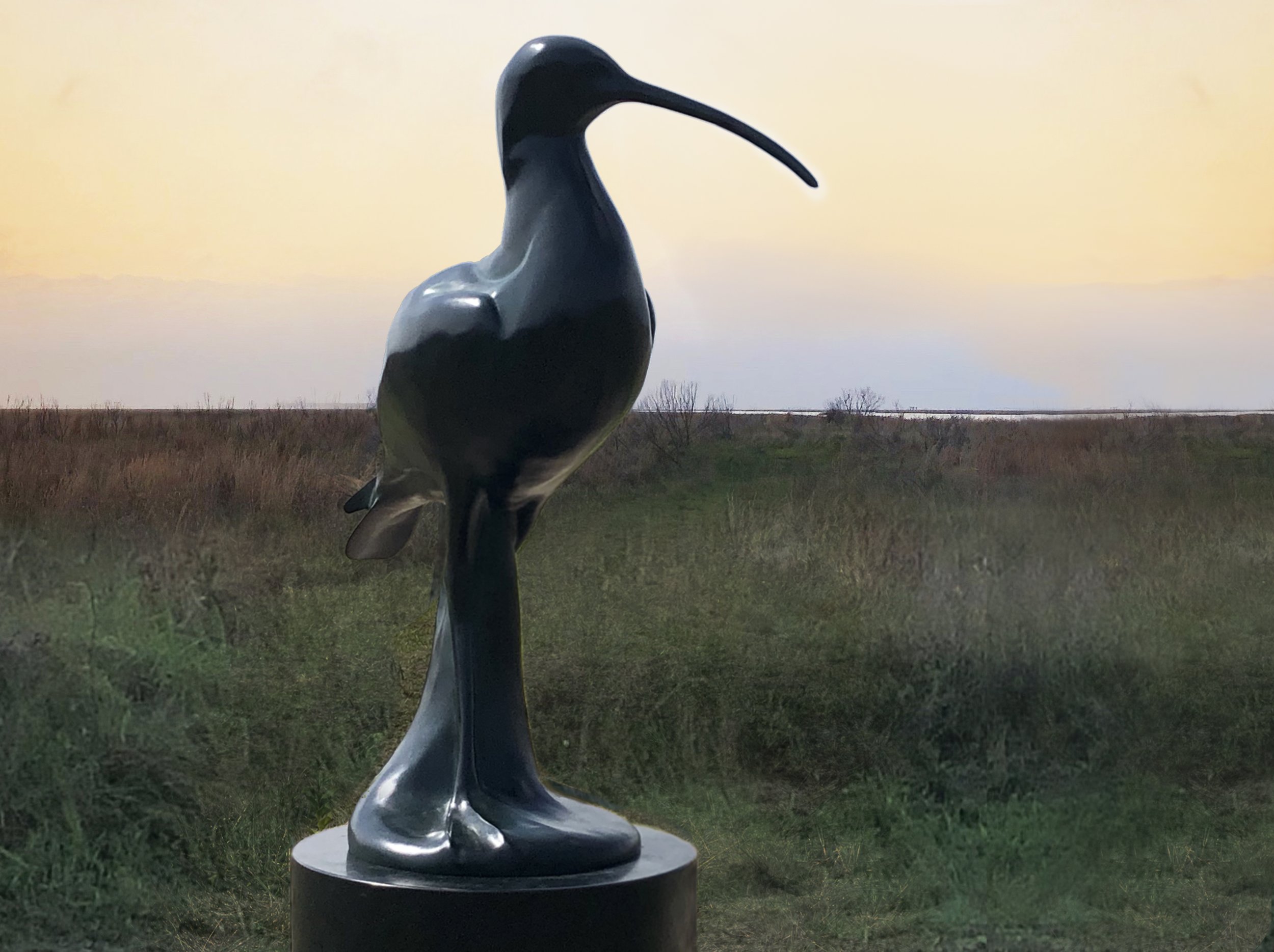Memorials to Lost Birds
“They cannot dive out of a cloud, nor clap their wings in thunderous applause. They know no urge of seasons; they feel no kiss of sun, no lash of wind and weather, they live forever by not living at all.”
— Aldo Leopold, 1947
The Lost Birds
The Lost Bird Project recognizes the tragedy of modern extinction by immortalizing North American birds, which have been driven to extinction, including the Passenger Pigeon, the Eskimo Curlew, the Carolina Parakeet, the Labrador Duck, the Great Auk, and the Heath Hen.
The bronze sculptures are subtle, beautiful, and hopeful reminders. The human scale of each sculpture elicits a physical sympathy. The smooth surface, like a stone polished from touch, conjures the effect of memory and time. The gestural forms contain a taut equilibrium, a balanced pressure from outside and from inside—like a breath held in. As a group they are melancholy, yet affirming. They compel us to recognize the finality of our loss, they ask us not to forget them, and they remind us of our duty to prevent further extinction.
The Lost Bird Memorials are presented at specific locations directly related to the particular bird’s decline.
A second edition of the sculptures travel to outdoor exhibit venues including sculpture parks, natural history museums, zoos, preservation sites, and habitat refuges.
About the Film
““A stunning and evocative work about art, nature and our imperiled planet.”
– The Montreal Mirror
Gone and nearly forgotten in extinction, the Labrador Duck, the Great Auk, the Heath Hen, the Carolina Parakeet, and the Passenger Pigeon leave holes not just in the North American landscape but in our collective memories. Moved by their stories, sculptor Todd McGrain set out to create memorials to the lost birds—to bring their vanished forms back into the world. The Lost Bird Project follows the road-trip that McGrain and his brother-in-law, Andy Stern, take as they search for the locations where the birds were last seen in the wild and negotiate for permission to install McGrain’s large bronze sculptures there.
The film is directed by Deborah Dickson, whose previous films have been nominated three times for Oscars, and is produced by Muffie Meyer, whose previous directing credits include the original Grey Gardens documentary and several Emmy award-winning documentaries. The score, composed by Grammy-winner Christopher Tin, is a stirring tone-poem for chamber orchestra, evoking the majesty of these flocks of birds, and the pathos of their eventual demise.
Traveling all the way from the tropical swamps of Florida to Martha’s Vineyard to the rocky coasts of Newfoundland over a period of two years, McGrain and Stern scout locations, talk to park rangers, speak at town meetings and battle bureaucracy in their effort to gather support for the project. McGrain’s aim in placing the sculptures is to give presence to the birds where they are now so starkly absent. “These birds are not commonly known,” he says, “and they ought to be, because forgetting is another kind of extinction. It’s such a thorough erasing.”
The Lost Bird Project is a film about public art, extinction and memory. It is an elegy to five extinct North American birds and a thoughtful, moving, sometimes humorous look at the artist and his mission.
About the Book
Hardcover: 100 pages
Publisher: UPNE (September 2, 2014)
Language: English
ISBN-10: 1611685664
ISBN-13: 978-1611685664
Product Dimensions: 12.2 x 9.4 x 0.4 inches
Reviews
“The Lost Bird Project is a moving tribute to species that have been lost through human action or indifference. With more and more birds going the way of the Great Auk, it should serve not just as a memorial, but as a goad to action.”—Elizabeth Kolbert, author of Field Notes from a Catastrophe
“The Lost Bird Project is a wonderfully original, moving, and educational work of tribute to extinct species of birds that once populated the American wilderness. Its sculptures, and their placements, are unique. What a grand idea!”—Richard Rhodes, author of John James Audubon: The Making of an American
“To honor these birds, and our loss of them, as this book will do, is a natural, necessary, and self-respecting part of our human journey.” —Joanna Macy, author of World as Lover, World as Self








